Let’s Connect & Accelerate Your Organic Growth
- Your data is properly secured encrypted by SSL
Google’s algorithm updates often come with noticeable shifts in website rankings. If you’ve seen a sudden drop in your site’s visibility or a decline in organic traffic despite steady content efforts, the issue may lie in your backlink profile. In this blog, we’ll take a closer look at what the Google Penguin update is, SEO impact, how to identify if your site has been affected, and the steps you can take to recover effectively.
What is Google Penguin Update?
Google’s Penguin update brought about a drastic change in organic search results. As per the guidelines of Google, websites that were using black-hat SEO techniques like keyword stuffing, cloaking, and the use of link schemes for link building were affected post the rollout of the Penguin update.
Unlock higher rankings, quality traffic, and increased conversions through tailored award-winning SEO strategies.
Elevate your web presence by Infidigit’s SEO solutions.
Unlock higher rankings, quality traffic, and increased conversions through tailored award-winning SEO strategies.
Why Was the Penguin Update Introduced?
The Panda update was about the amount of content value present on the website, which is also known as “thin content.” The Penguin update worked as an extension of the Panda update.
With the Penguin update, the main goal was to understand how to overcome the effectiveness of Black Hat SEO techniques in a better way. Matt Cutts, in an SMX conference, said that they were looking for an upgraded technique to tackle the low-quality content. They initially started with the Panda update, but then came across lots of clings in the content, thus leading to the introduction of the Penguin update.
The Penguin algorithm update works with the website’s incoming links and not the outgoing links. It deals with/gauges naturally-generated links, authentic links, and the relevancy of the links obtained.
Also Read :
Google Penguin Algorithm Update: Timeline and Versions
The Penguin update was officially launched on April 24, 2012. Google estimated that around 3% of its search results would be affected by the update.
Many e-commerce stores, large B2B companies, and nationally recognized brands were affected severely by the launch of the Penguin update. Some experienced a drop in traffic, whereas some saw an increase; still, some had no impact.
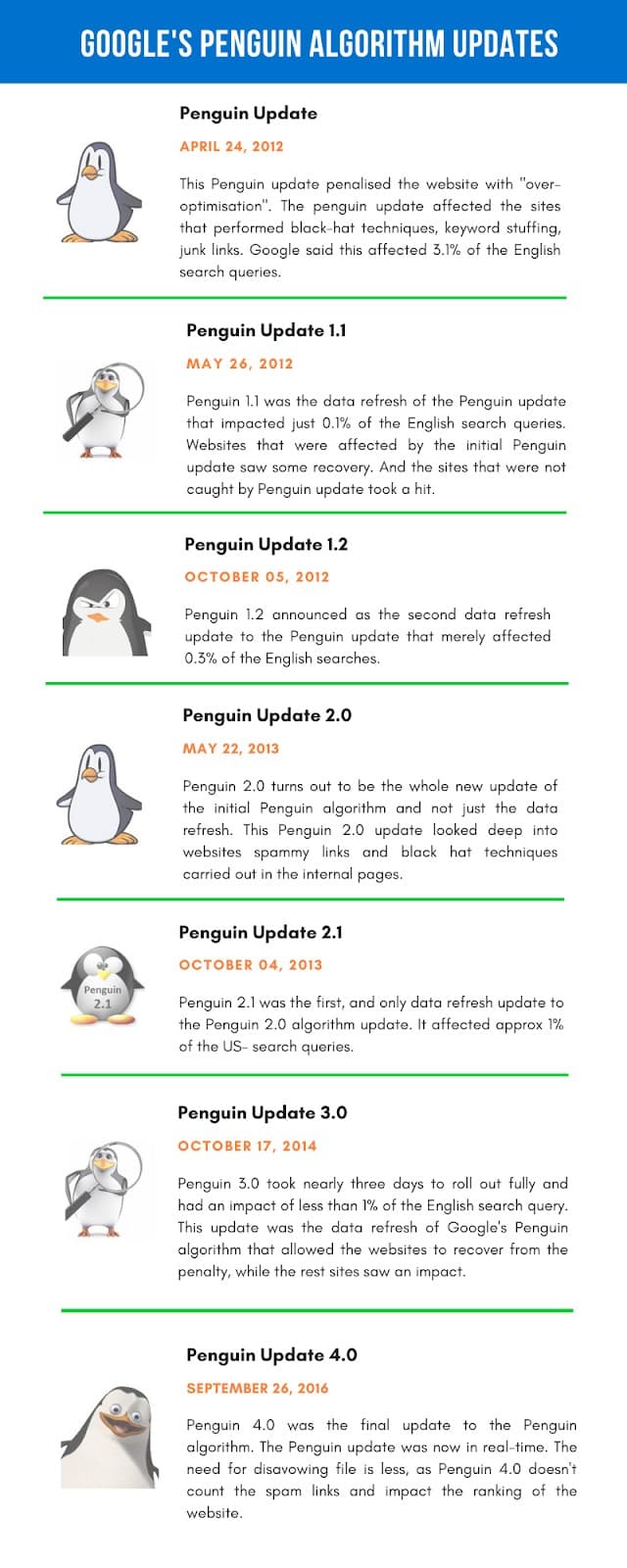
How the Penguin Algorithm Update Impacts Rankings
The Penguin algorithm is designed to evaluate link quality and penalize manipulative practices. If a site relies on unnatural backlinks or over-optimized anchor text, Penguin may suppress its rankings. Here’s how it impacts SEO:
- Link Spam Detection and Penalties: Penguin targets sites that gain backlinks through spammy or manipulative methods, such as paid links, link farms, or irrelevant directory submissions. These links can lead to a loss in rankings or partial devaluation of specific pages.
- Over-Optimization and Exact Match Anchor Text: Using exact match anchor text excessively can signal unnatural linking patterns. Penguin flags this tactic as manipulative, especially when used to influence rankings rather than provide genuine value.
- Real-Time Updates After Penguin 4.0: Penguin 4.0 made the algorithm part of Google’s core system, enabling real-time link evaluations. Now, spammy or low-quality links can be devalued quickly, and recovery from past issues happens faster. This update shifted Penguin’s focus from site-wide penalties to granular link devaluation, making regular backlink audits essential.
Signs You’ve Been Affected by the Google Penguin Algorithm
Google Penguin primarily targets unnatural backlink profiles. If your site has been affected, you may notice sudden changes in performance, particularly around link-related updates. Here are key signs to watch for:
- Drop in Keyword Rankings: A sharp drop in rankings for target keywords, especially those using exact-match anchor text, may indicate Penguin impact. Pages that previously ranked well can suddenly fall if they’re linked to from spammy or irrelevant sources.
- Traffic Decline from Organic Search: If your site experiences a sudden and sustained drop in organic traffic, particularly around the time of a known Penguin update, it could signal algorithmic devaluation of bad links. Use Google Analytics and Search Console to compare traffic trends.
- Manual Actions vs Algorithmic Downgrades: Unlike manual actions, Penguin penalties are algorithmic and don’t appear in Search Console notifications. If no manual penalty is listed but you’ve lost rankings or traffic, Penguin could be the cause. Algorithmic issues require cleaning up backlinks, not filing reconsideration requests.
Google Penguin Recovery: How to Recover from a Penguin Update Penalty?
As per the research, low-quality directories and paid link networks were affected by the Penguin update. Perhaps, once you get to know that your website has been hit by the Penguin algorithm update, consider the following steps to recover:
Use the Disavow Tool Cautiously
Disavow all the unnatural links of your site. In the Disavow tool, select your website and upload the disavow file that contains all the spammy links that need to be submitted to Google, asking it to ignore these links. This will ensure that there is no impact on your site’s rankings.
Focus on Natural Link Building
Earn backlinks by creating valuable, relevant content that others want to reference. Avoid paid links or manipulative tactics. A clean, diverse link profile from trusted sources helps improve rankings and keeps your site safe from Penguin penalties.
Have you faced any recent drop in traffic? If yes, it can be because of the rollout of a recent Google update. We provide Google Penalty Recovery Services to help our clients recover from such updates and also make sure they follow the best practices in SEO, going forward.
Penguin vs Panda: What’s the Difference?
While both Penguin and Panda are major Google algorithm updates, they target different aspects of SEO.
Google Penguin focuses on backlink quality. It penalizes websites with manipulative link-building practices, such as spammy backlinks or overuse of exact-match anchor text.
Google Panda, on the other hand, targets content quality. It lowers the rankings of websites with thin, duplicate, or low-value content that offers little user benefit.
In short, Penguin addresses off-page SEO issues, while Panda focuses on on-page content quality. To stay safe from both, prioritize creating helpful content and earning natural, high-quality backlinks.
Conclusion
The Google Penguin Update marked a significant shift in how search rankings are influenced by backlinks. By targeting manipulative link-building practices, Penguin pushed SEOs and website owners to focus on quality over quantity. To maintain strong search visibility, it’s essential to monitor your backlink profile, avoid spammy tactics, and build natural links through valuable content. Staying aligned with Google’s guidelines not only helps you recover from past penalties but also protects your site from future algorithmic impacts.
FAQs
What did the Penguin update do?
The Penguin update targeted websites using manipulative link-building tactics, such as spammy backlinks and over-optimized anchor text. It penalized or devalued sites with unnatural link profiles, reducing their rankings in search results. Penguin now works in real time and is part of Google’s core algorithm.
How do I remove the Google penalty?
If your site is hit by a Penguin-related penalty, start by auditing your backlink profile. Remove or disavow spammy, low-quality links using tools like Google Search Console. Then, focus on building natural, high-quality backlinks. Since Penguin penalties are algorithmic, improvements in your link profile can lead to recovery without a manual reconsideration request.
Popular Searches
How useful was this post?
0 / 5. 0


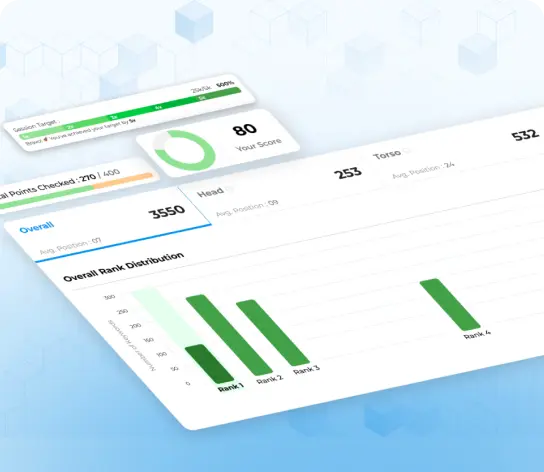








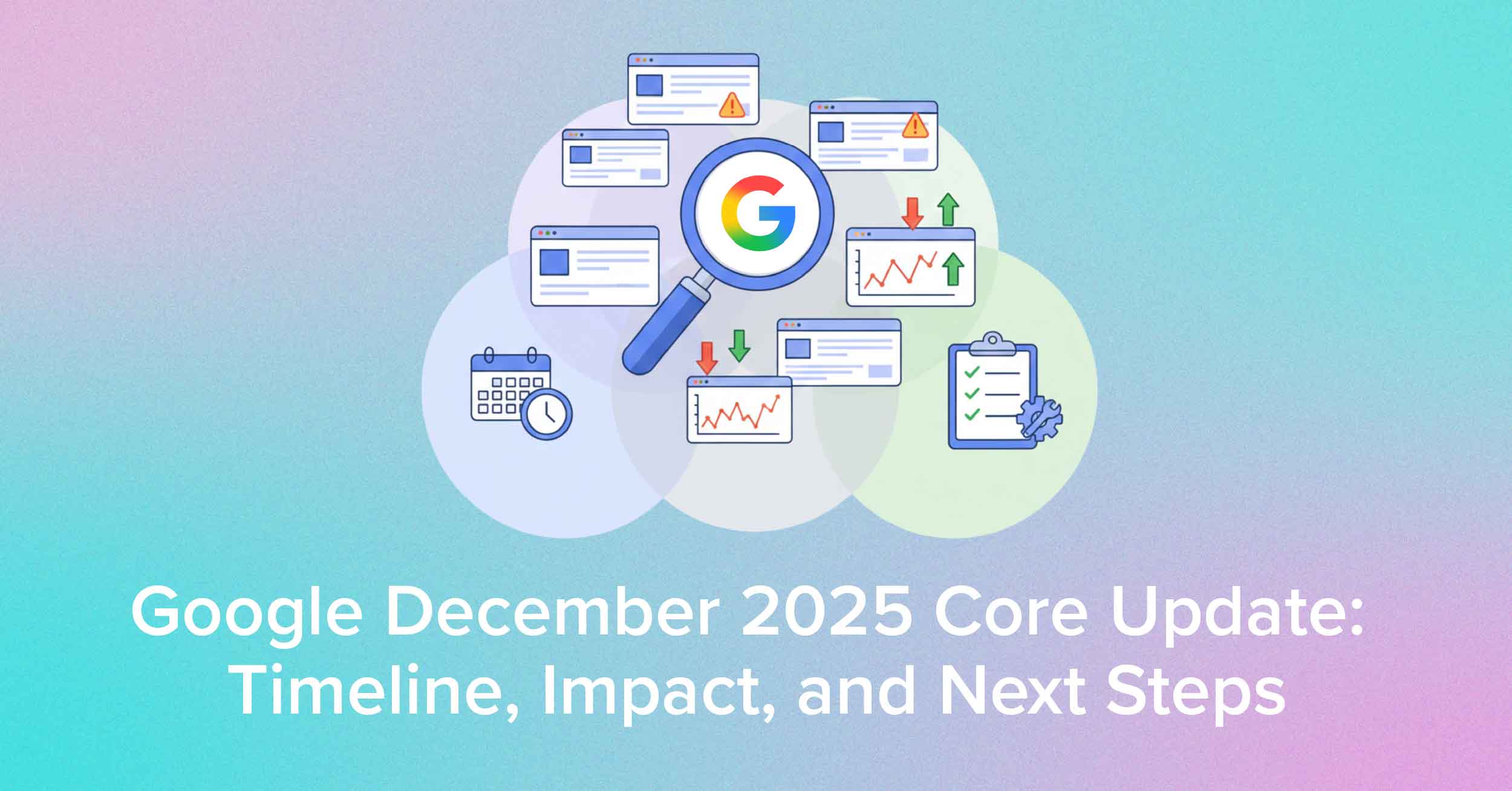
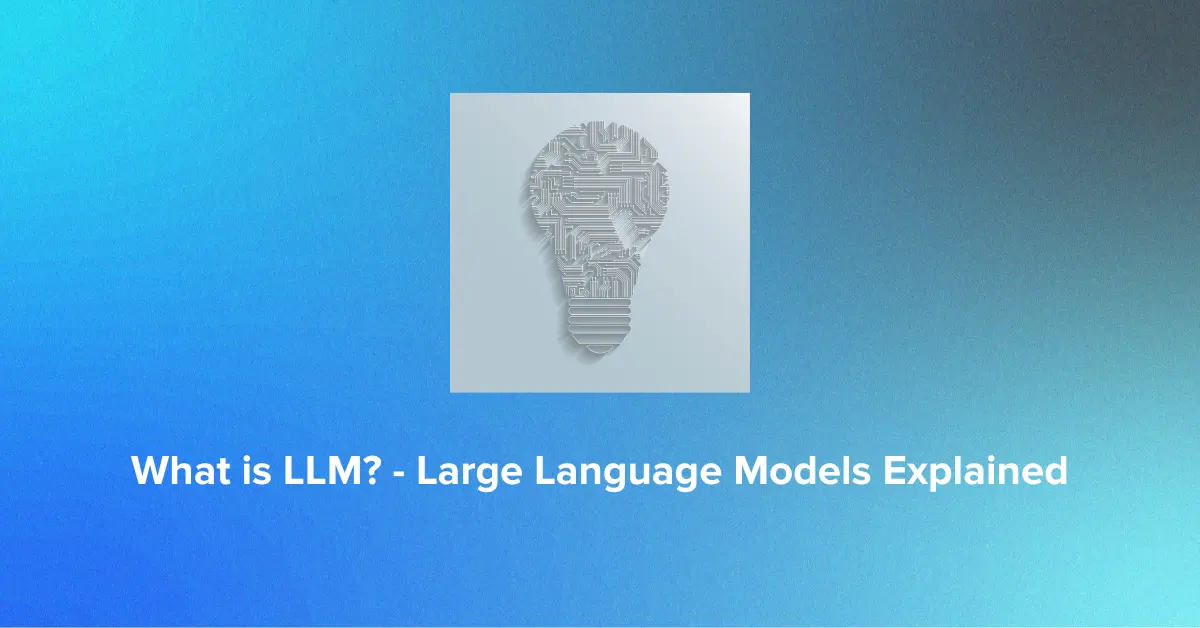



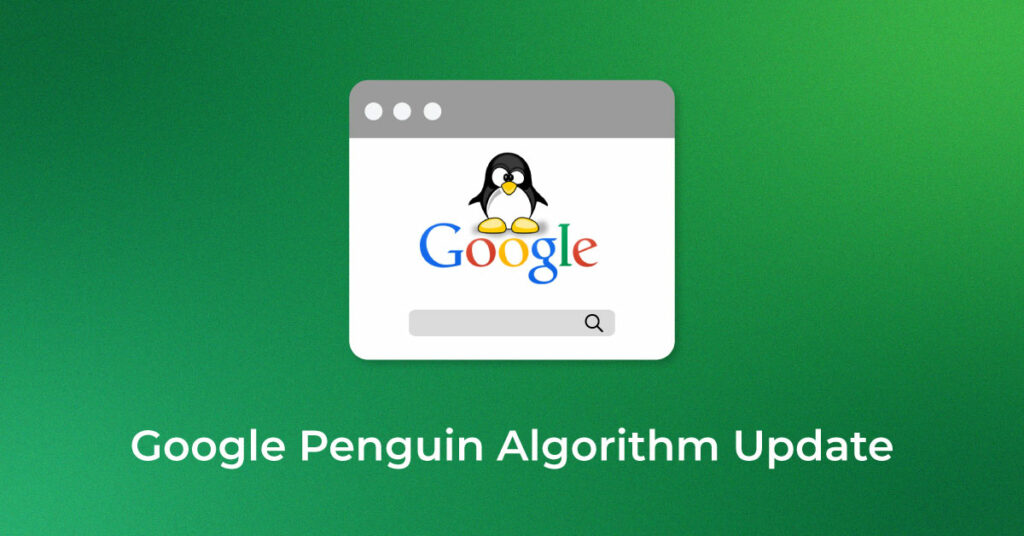
5 thoughts on “Google Penguin Update: How Google’s Algorithm Affects Rankings”
Damn, I was having over 200k ahrefs traffic & now down to 60k on 5th May 2020 If anybody knows how to fix please help.
Every time when Google releases its core algorithm updates, it is related to changes in search behavior & trends or content. There are many reasons for the drop in rankings. Do check our latest posts for updates.
Hi There. Thank you for sharing the knowledge related to the penguin update.
Thanks.
That was an amazing article about Google Penguin, it helps me in understanding how Google Penguin is important.